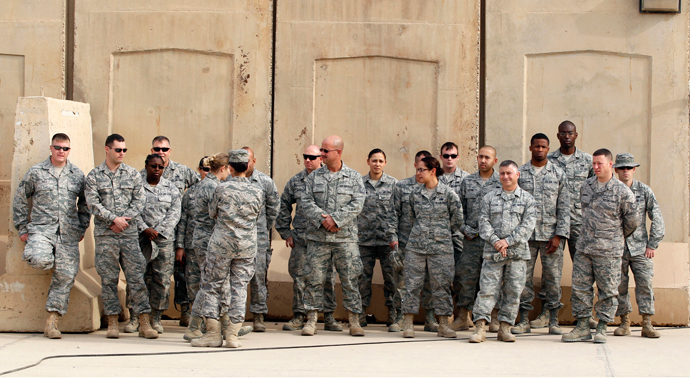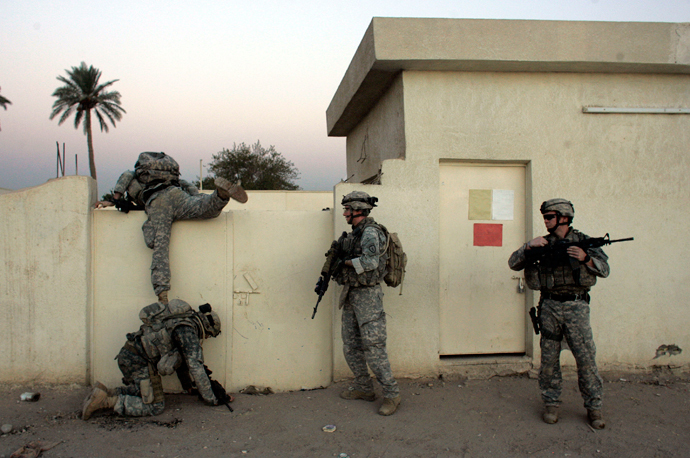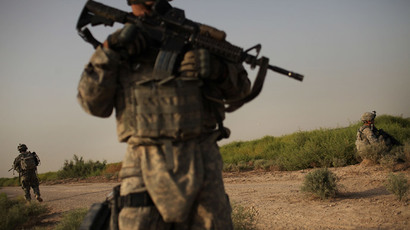600+ American troops reportedly exposed to chemical weapons in Iraq

The Pentagon acknowledged that more than 600 American service members did alert military medical staff they had been exposed to chemical weapons while serving in Iraq. The military admits it failed to track the cases, or offer treatment to the troops.
The news comes after US Defense Secretary Chuck Hagel ordered an internal review of Pentagon records, which have now uncovered hundreds of troops who told the military they believed they were exposed to chemical weapons.
Oh look, another shiny object -> More Than 600 Reported Chemical Exposure in Iraq, Pentagon Acknowledges http://t.co/wvD7uiRtxQ
— Joseph DiLuca (@joeinthejeep) November 7, 2014
A spokesman for the Army surgeon general told The New York Times
on Thursday that the review showed 629 people answered
“yes” to the question of chemical exposure, and also
filled in a block with details about the chemical agent they were
exposed to. The Army spokesman said each person would have
received a medical consultation at the end of their combat tour.
READ MORE:Veterangate: VA whistleblower says records of deceased vets were altered
Once the records were submitted, the military failed to take any further steps with the soldiers for more than a decade. The Pentagon did not compile data, monitor veterans with medical complaints, or circulate warnings to other soldiers and the Department of Veterans Affairs. Despite the men and women receiving wounds in action, the soldiers were not awarded Purple Hearts – one of the oldest and most sacred military awards.
The costs of US govt secrecy & Iraq invasion were even worse than we thought http://t.co/aSFnS2LMRQ
— Daphne Eviatar (@deviatar) November 7, 2014
READ MORE:Washington concealed US troops exposure to chemical weapons in Iraq – intel docs
The Pentagon told the Times it has asked the Public Health
Command to identify all veterans who reported a possible chemical
exposure, gather their medical records, conduct interviews and
carry out possible medical examinations. They have also revived a
telephone line, 1-800-497-6261, for chemical weapons exposure
complaints.
“It’s too little, too late,” said Jordan Zoeller, a
former Army sergeant who served in a platoon that was exposed to
sulfur mustard agent in 2008, to the newspaper.

“Mr. Zoeller was medically retired after developing a series of health problems, including asthma and psoriasis,” the Times reported. “He said his breathing trouble began within weeks of the chemical episode, though he is not sure its onset was related to mustard agent because the Army denied that he had been exposed and did not examine his claims.”
READ MORE:Pentagon to monitor Iraq war veterans for chemical weapons exposure
The internal review was called following an investigative report last month by the Times into the illnesses experienced by 17 soldiers related to chemical weapons exposures to sarin and mustard gas, which occurred when handling abandoned and re-used munitions during the Iraq war. Once the story ran, another eight soldiers came forward with their stories about chemical weapon exposure.
Pentagon: Over 600 Service Members Reported Chemical Exposure in Iraq http://t.co/ix7AN1f01C. Wonder where the chemicals were?
— Lois J Teston MD (@LoisTeston) November 7, 2014
At the time of the NYT report, the Pentagon said it will carry
out medical exams and health monitoring for service members and
veterans exposed to chemical weapons in Iraq.
Military brass said the information was kept classified so
insurgents would not learn the whereabouts of Iraq's old
munitions.














